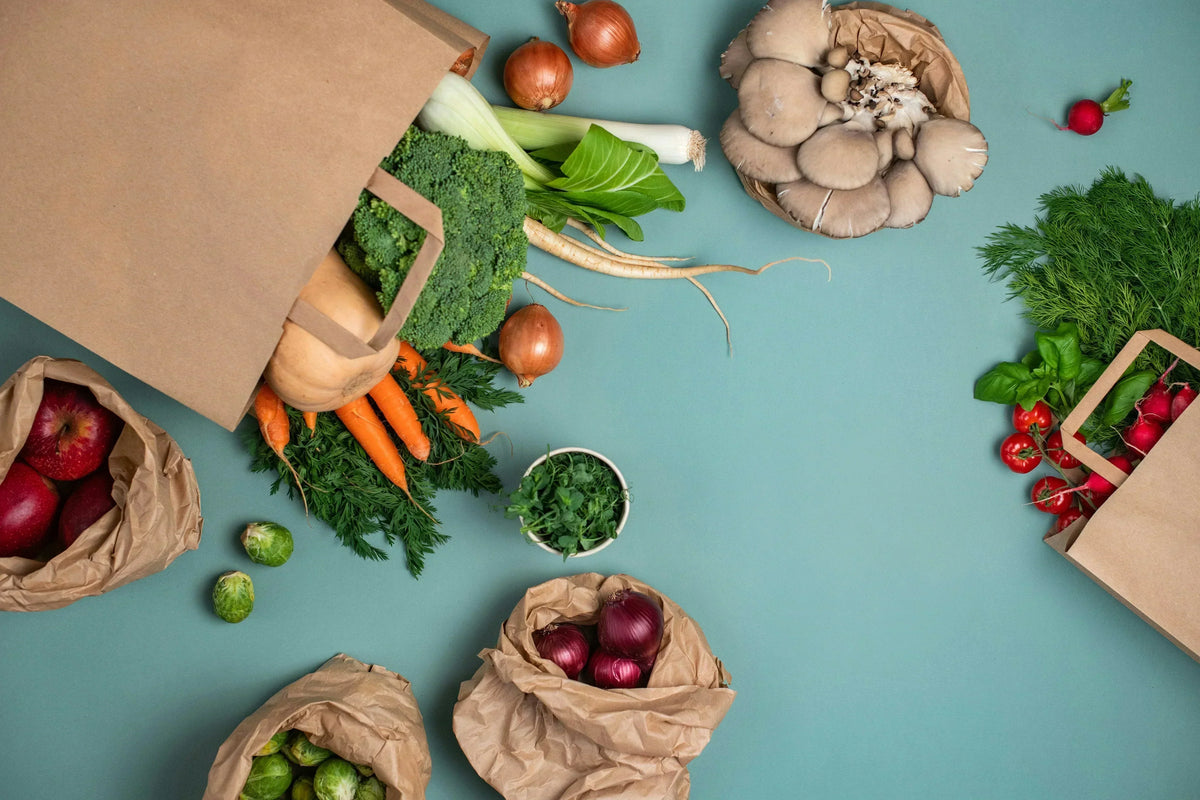Looking to extend the life of your duvet while keeping your sleep eco-conscious and comfortable? Choosing an eco-friendly duvet cover is one of the smartest and most sustainable choices you can make. Natural materials like bamboo are not only breathable and gentle on the skin, but also help reduce allergens, trap less moisture, and prevent dust build-up. By shielding your duvet from wear and tear, eco covers reduce the need for frequent washing - preserving both the duvet and the planet. Plus, they’re easily washable without releasing microplastics into our waterways. A breathable, hypoallergenic cover also supports a fresher, healthier night’s sleep. With a few simple habits - like airing out your bedding, rotating your duvet, and investing in the right cover - you’ll enjoy better sleep and help your bedding last for years to come.
Share your articles with us and get published! Reach out at hello@friendlyturtle.com.
Sustainable Eating: 7 Eco-Friendly Food Choices

A survey carried out by Ipsos in 2018 suggests that there are around 230 million vegans worldwide.
Some assume that lifestyle choice for religious reasons, while others adopt it as a way to keep on top of their health. There then are those who realise that what they eat has a significant impact on the planet and, therefore, choose to do so as sustainably as possible.
It might not be something you think about often, but from deforestation for agriculture to the environmental impact of transporting food around the globe, our dietary choices do shape the environment in more ways than we might realise.
Thankfully, this is something you can directly control – at least from a personal perspective. And you don’t have to be a vegan either to do so.
Even if you are partial to the odd steak or roast chicken dinner, you can reduce your carbon footprint through your culinary choices.
Here are seven ways you can eat more sustainably.
1. Opt for Plant-Based or Sustainable Meat Alternatives
Perhaps the easiest way to reduce your environmental impact is to incorporate more plant-based meals into your diet.
Studies show that plant-based diets require significantly fewer resources, such as land and water, and also produce lower greenhouse gas emissions than meat-heavy diets.
If you’re not ready to cut out meat entirely, consider switching to sustainably sourced meat and seafood. For instance, look for grass-fed, free-range, and certified organic options, and try to support local farmers who prioritise ethical and sustainable practices.
Another great option is to include convenient plant-based meals into your weekly dining routine, such as those offered by Soulara vegan meal delivery, which tick the boxes of being delicious, nutritious, and environmentally friendly.
2. Choose Seasonal and Local Produce
When fruits and vegetables are grown in their natural season, they require fewer artificial inputs, such as energy-intensive greenhouses or chemical fertilisers. Therefore, buying seasonal and locally grown produce is a fantastic way to lower your environmental footprint.
Shopping at farmers’ markets or subscribing to a community-supported agriculture (CSA) box helps support local farmers. Additionally, local produce doesn’t have to travel thousands of kilometres to reach your plate, which results in fewer emissions from their transportation.
This means you get fresher, more nutrient-rich produce that hasn’t spent weeks in cold storage or transit.
3. Reduce Food Waste
Australians throw away about 7.6 million tonnes of food each year, much of which is perfectly edible. This waste doesn’t just harm our bank balance, but it also contributes to methane emissions from landfills, which is a major driver of climate change.
To cut down on food waste, try to plan your meals ahead of time and buy only what you need. Properly storing food can also extend its shelf life, so keeping herbs in water, freezing leftovers, and using airtight containers for dry goods can all help reduce waste.
Another great habit to get into is repurposing scraps. Vegetable peels, for example, can be turned into broth, overripe bananas make excellent smoothie ingredients, and stale bread can be transformed into croutons or breadcrumbs.
4. Support Sustainable Packaging
According to Plastics Oceans International, some 380 million tons of plastic are produced every year, and upwards of 50% of that is for single-use purposes such as food packaging.
For this reason, it is a good idea to choose food with minimal or compostable packaging as this will help to reduce this wastage. Moreover, when you go shopping, remember to bring reusable bags, containers, and produce sacks with you to cut down on plastic consumption.
If you’re buying pantry staples like rice, nuts, or flour, consider visiting bulk food stores where you can fill your own reusable jars and bags. Some stores even offer refill stations for items like olive oil, honey, and even cleaning supplies, which reduce unnecessary packaging waste.

5. Grow Your Own Food
Growing your own food is a great way to eat sustainably, and you can do it even if you don’t have a large backyard.
Herbs like basil, mint, and coriander can thrive in small pots on a sunny windowsill, while vegetables such as lettuce, tomatoes, and capsicums can be grown in balcony planters.
The great thing about home gardening is that it reduces one’s reliance on store-bought produce, which might have been grown with heavy chemical fertilisers or transported long distances. It is also incredibly rewarding to cook with ingredients you’ve nurtured yourself!
6. Choose Ethical and Sustainable Brands
Many food brands are taking steps to become more environmentally responsible, as evidenced by certifications such as Fair Trade, Rainforest Alliance, or Australian Certified Organic, which are displayed on their packaging and indicate ethical sourcing and sustainable farming practices.
For seafood, the Marine Stewardship Council (MSC) certification ensures that fish has been sourced responsibly, and if you drink coffee or tea, there are several brands that support ethical farming.
7. Don’t Eat Processed Foods
Processed foods really don’t have a lot going for them other than maybe convenience.
For a start, they are not very good for you, providing little in the way of nutritional value, and they often require large amounts of energy, water, and packaging in their manufacturing process.
Additionally, they can contain ingredients, such as palm oil and soy sourced from unsustainable plantations, that contribute to deforestation and biodiversity loss. So, ultimately, they are best avoided.
Instead of reaching for processed snacks when the hunger pangs hit, try whole foods like nuts, seeds, fruits, and homemade snacks.
Moreover, the more meals you can cook from scratch using fresh ingredients, the better. Doing so allows you to control what goes into your meals and certifies to yourself that you are supporting sustainable agriculture.
0 comments
Let customers speak for us
Blog posts
When planning a game day party, knowing how many drinks to buy helps reduce stress and avoid waste. As a guide, allow two drinks per person for the first hour and one for each additional hour. Offering alcohol-free options and using smaller cans or cups will help pace consumption and keep guests happy. Pre-chilling drinks and labelling coolers makes your set-up more organised. At Friendly Turtle EcoBlog, we recommend using reusable cups and locally produced drinks for a more sustainable gathering. These simple yet effective tips will help you protect the planet while enjoying the match with your guests.
Dust mites are often the unseen culprits behind a child’s persistent sniffles, coughs, and red, watery eyes. Found in bedding, carpets, toys, and upholstery, these microscopic creatures can trigger strong allergic reactions - especially in sensitive children. While medications may help, natural approaches often provide gentle, effective relief. This guide shares simple, low-tox methods for reducing dust mites at home, including using allergen-proof bedding, lowering indoor humidity, improving ventilation, and choosing easy-to-clean surfaces. You'll also discover how child-safe essential oils, regular baths, and smart cleaning habits can create a healthier living environment. With a few small changes and consistency, you can help your child breathe easier, sleep better, and enjoy more allergy-free days - naturally and sustainably.



